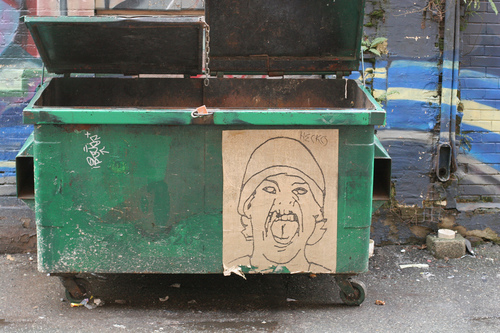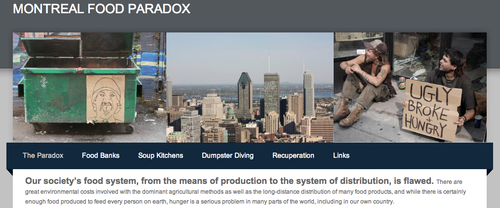Montreal Food Paradox

Many
Montrealers are aware of the environmental damage caused by the modern
industrial food system. Many are also aware of Montreal's status as home to
Canada's highest rates of poverty and hunger[1].
What is not often considered
is that an individual's food habits, encouraged by the city's food landscape,
directly influence those two factors, and neither is it well known that there
are many alternatives available in Montreal which provide access to healthy,
low-cost food.
The problem of hunger on the international scale was originally understood as
food shortage. However, upon closer examination, it has become clear that
people are not going hungry because there is not enough food produced, but
rather because it is not reaching them. This disparity is also reflected in our
own nation; though 15% of our population is on the verge of going hungry (a
study by The Daily deemed 3.7 million people in this country "food
insecure")[2], the Environmental Protection Agency's estimations state
that it would be possible to sustain Canada's population entirely on the food
thrown in the garbage in the US[3].
Linked
with the social cost of food waste is the environmental cost, as every calorie
of food not eaten is tied to the energy and water consumption that went into
producing it[4], which can be particularly high with the current industrial
agriculture practices and distances we are accustomed to our food travelling
before reaching the table. Because the Canadian food landscape is filled
overwhelmingly with low quality and low-cost foods (chemically grown produce on
superstore shelves, factory-produced meat at fast-food restaurants etc.), this
is where many people turn for lack of money to pay for or time to find
alternatives[5].
The fact is, however, that in Montreal there are many organizations concerned
with providing alternatives[6]: Food not Bombs is an anti-war and anti-poverty
group who regularly serve food and promote community cohesion at various
outdoor locations in St Henri and the Plateau; the Multi-Caf is a kitchen in
Cote-des-Neiges which serves hot breakfast and lunch for $1 to anyone who comes
by during the week; the Peoples Potato and the Midnight Kitchen alike are
student run vegan lunch spots on Concordia and McGill campuses respectively
where anyone (though the clientele is predictably mostly students) can get a
delicious free/by donation vegan lunch; La Garde-Manger Familiale is a food
bank based in a church basement near Metro Rosemont, where $2.50 pays for a
backpack full of fresh fruit and vegetables as well as other grocery-store fare
(pizza crusts, frozen French fries, canned goods etc.). Many of these places
make use of donated food- often, food that is of good enough quality to eat but
not good enough quality to sell, and would otherwise be headed for the
landfill.
As industrialized agriculture continues to gain dominance and Montreal's food
landscape's fast-food cohort grows, the problems of hunger amongst lower-income
citizens and environmental damage caused by the production methods will only
increase. The main factors keeping Montrealers from making use of the
alternative food options available to them are stigma associated with making
use of food banks (among the upper class at least) and lack of familiarity with
the services that exist.
[1]"Urban
Poverty in Canada: A Statistical Profile Canadian." Council on Social
Development. April 17, 2000. http://www.ccsd.ca/pubs/2000/up/hl.htm. October 25
2010.
[2] "Food Insecurity in Canadian Households." Statistics Canada. The
Daily, August 15, 2001.
http://www.statcan.ca/Daily/English/010815/d010815a.htm. October 25, 2010.
[3], [4] "Food Waste has Environmental Impact: Scientists." CBC News. November 25, 2009. http://www.cbc.ca/technology/story/2009/11/24/tech-environment-food-waste.html. October 25th, 2010.
[5] Jeffery Sobal and Brian Wansink. "Kitchenscapes, Tablescapes, Platescapes and Foodscapes." Environment and Behaviour 39.1 (2007): 124-142.

Leave a comment